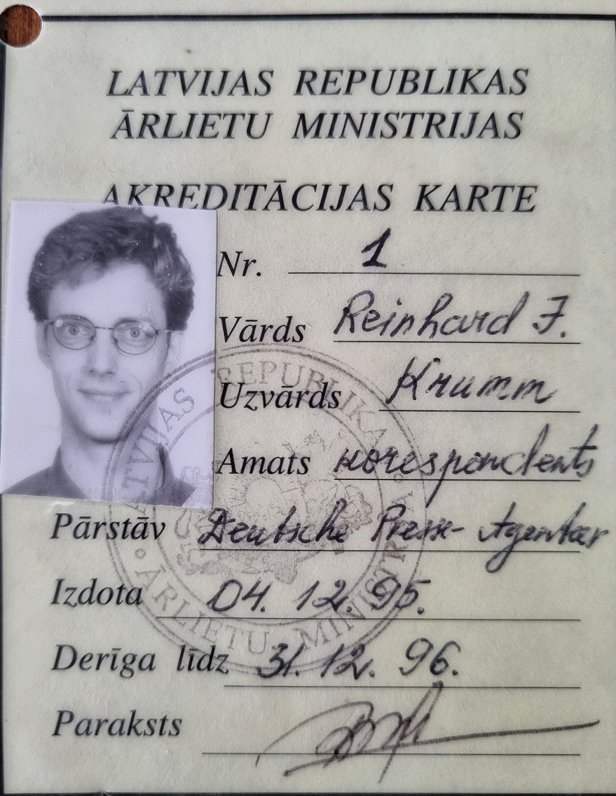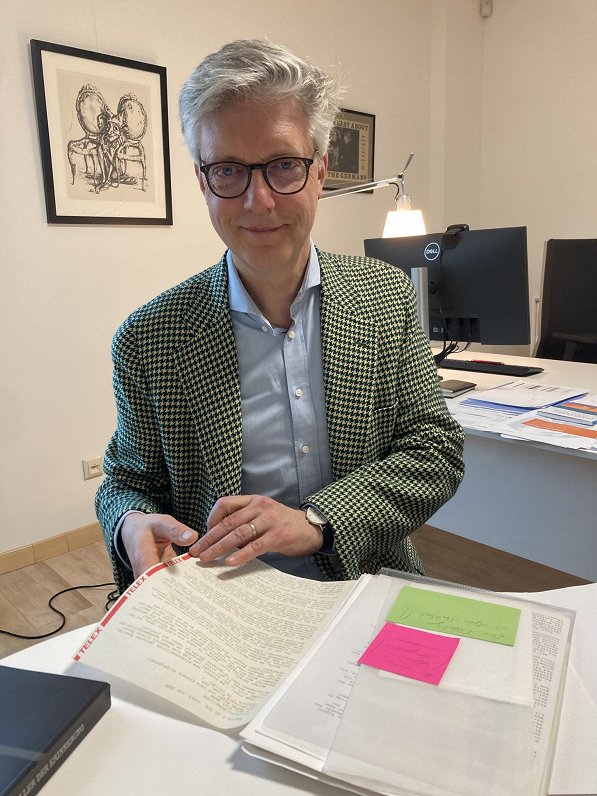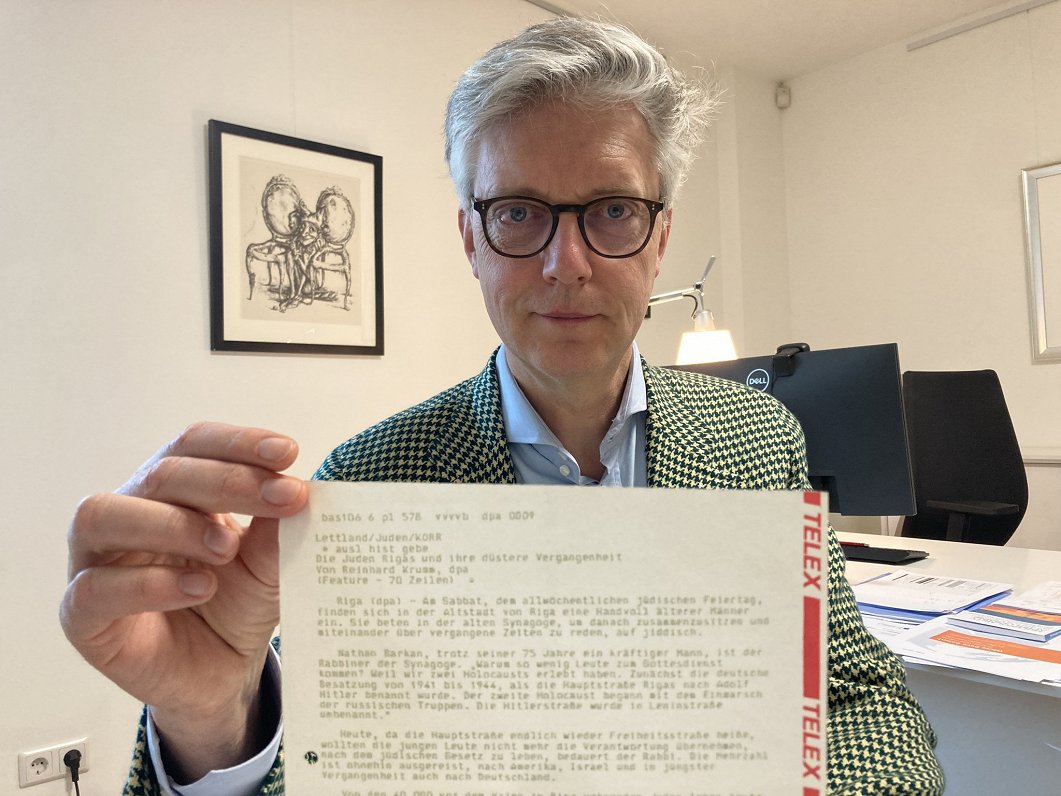Foreign correspondents have long been the interpreters of global events. Their task is both simple and difficult at the same time: do not miss anything relevant – bear witness and report everything that is worth reporting from places where others could not go and inform back on what occurred.
While in the digital age a range of new technologies make it far more possible to do reporting without always being on location, it certainly was not the case at the end of the twentieth century, when the Cold War ended, the Soviet Union collapsed and borders in Europe were redrawn. Being there on the scene was relevant and necessary – be it to write or take photos or videos.
One of the few foreign correspondents that have experienced first hand both the far-reaching events on the ground in Moscow and later on also in Latvia was Reinhard Krumm. The German journalist and historian was possibly the first permanently based Western correspondent in Latvia after the country regained its independence.
Krumm came to Latvia in July 1994 to set up and head the Baltic office of the German Press Agency dpa. Having previously worked as a freelance journalist in Russia for German media and eye-witnessing the end of the Soviet Union, the then 32 years old Krumm was set to report about the political, economic and social-cultural transformation in the Baltics.
"Back then in the times of big changes, dpa wanted to have someone on the ground to be able to follow closely the epochal events and developments. The Baltic states were free and independent again, had to renew and build up their own state in challenging times and no one really knew if they will succeed", Krumm remembered in an interview with LSM, adding that his task was to deliver vivid accounts of breaking news and nuanced analysis of longer-term developments for the German-speaking and international audience.

His work in the region was ground-breaking for many other German journalists and provided the necessary background information for their own stories. The German Press Agency dpa is one of the major independent international news agencies, with multimedia news services in German and other languages.
Founded as an independent joint venture of the German media, dpa has a network of correspondents stationed around the world who report about a variety of topics. The agency is one of the few international media outlets that have retained a local presence in Latvia until today, covering the Baltics from Rīga.
From Moscow to Riga
Before the arrival of Krumm, dpa had covered the event in the Baltics from its office in Moscow. "I was approached by the then chief dpa correspondent in Moscow and asked whether I can imagine to move to Rīga to report from there. It was a classic coincidence and took me not long at all to agree and take on the offer. This was an one-off chance“, he told LSM, adding that personal reasons were also strongly influencing his decision.
"First of all, I am from Hamburg and have specialized in the history of Eastern Europe, so the countries were pretty close to me anyway. And secondly: my father was born in Insterburg, which is now Chernyakhovsk in the Kaliningrad oblast [formerly Konigsberg]. So I always have had an interest in this region.“
While other foreign outlets kept the usual practice of sending journalists in briefly to cover important events, Krumm settled down long-term to report about Baltic affairs for German news outlets. "I was basically given free hand to organize the coverage and could mostly choose myself the topics that I wanted to report about, “ he told LSM, indicating that being a foreign correspondent involved a lot of journalist field work back then.
“In general, you had to move around in the Baltic capitals, go to parliament from time to time to talk to the then mostly male politicians about the upcoming reforms and also frequently travel around between and within the Baltic countries.”
Krumm in particular reported on economic issues and the transformation from a state planned to free market economy, but also on the Baltic states' aim to build closer ties with NATO and the EU. The political developments and domestic politics also left their marks in his working agenda since the governments were constantly reshuffled.
The times were challenging. Three years after Latvia and its neighbours regained their independence the foundations of the state were just laid, the economic situation was very complicated and the related social changes fundamental and rapid.
“For Latvia it was very important to have someone like him on the spot – a Western journalist who witness with his own eyes on what happens here and reports as he see things happening. From his objective perspective to his audience in Germany and elsewhere“, the journalist and media researcher Ainars Dimants, who at that time used to be a commentator for Latvia’s biggest daily Diena, told LSM, describing Krumm as an “excellent colleague“ in times when a corrective independent media system was still in the making and dependent on the whole transformation process.
“The German Press Agency was very welcome back then, although I do not think all people really knew and understood what it actually was. But: Germany in association with press agency – that was enough. People were so happy that another representative from the west had arrived and I was welcomed with open arms”, says Krumm, who has fond memories about his time in Rīga, highlighting in particular his conversations with euphoric young people who had big plans and wanted to seize the opportunities of the new freedom: "The dreams were huge and rosy, but not all of them could be realized, of course, given the difficult circumstances of that time".
Challenging and turbulent times
Krumm’s assessment is echoed by some of his former companions and contemporaries. One of them was the Latvian-American human rights activist Nils Muižnieks who moved to Riga in 1993.
"Latvia was really a fascinating but also a quite a turbulent place in the 1990s. Every foreigner living here was welcome but had to have a sense of adventure and to adjust to the post-Soviet system daily life. Corruption was widespread and you had to get used to and deal with it, as well as with the economy of scarcity. For navigating through it, you needed contacts. This was very important but as foreigner you did not have them and developing a network from the scratch was difficult“, he told LSM.
Heading back then the Latvian Centre for Human Rights and Ethnic Studies (now the Latvian Centre for Human Rights), Muižnieks regularly met with Krumm and other members of the relatively small international community that used to live in Rīga in the mid-1990s.
“Reinhard stood out as clean-cut Western-looking guy who clearly was not from here. Foreigners like him were considered something exotic back then and often met with suspicions, especially if they spoke Russian or Latvian“, he said. “Many people kept things for themselves in these days since information was considered a tool of power and influence but we were open to each other and shared information among us.“
While obtaining information was in general not too much of an issue for Krumm because of his profession, verifying it turned out to be the greatest challenge.
“Many things were difficult to grasp. You heard a lot, there were many rumours about this and that but it was hard to get hard data and facts. I actually had to shelve quite a few potentially good stories because I simply could not get enough objective information on the topic“, the German journalist said of his struggle
to meet the strict editorial standards for fair, impartial and accurate coverage that are typical for dpa and other international media.

Despite these difficulties and the hardships in the every day life of the early 1990s, Krumm looks back with joy on reporting from the region. "There was a huge euphoria in Latvia, especially towards Germany. That was fantastic. You could basically report about anything. There were no restrictions – the doors stood wide open. The Latvian people were again able to and wanted to talk openly to everyone. I really enjoyed it“, Krumm said, adding he only encountered less willingness to talk and other limitations when reporting on topics such as
the difficult relationship with Russia or the Russian minority in Latvia.
“Critical journalism was still unknown in Latvia at the time and not that easy, because society actually expected foreign correspondents to report positively. So I can imagine that some of my reports probably were not received that well, but everything back then as today deserved also to be questioned and scrutinized“ Krumm believes, adding that in Germany the interest about his reports was all the greater. "I was surprised how well some stories actually were published."
Historical bonds, difficult logistics
Apart from covering a few top breaking news events such as the Russian troop withdrawal or the Estonia ferry disaster, Krumm wrote about the political and economic development plus many timeless pieces about culture, history and tourism.
“These stories were very easy to find. You simply had to keep your eyes and ears open since it felt like these countries were completely undiscovered. Latvia in particular has had so many historical references to Germany that finally could be reported on again after the country had been locked away so many years behind the Iron Curtain“, he explained.
“Many Germans knew back then nothing about the current conditions in the country, but the names of many cities and especially Rīga were still familiar to many. Plus there was a generation of older Germans who perhaps still had relatives in Latvia or were even born there before the Second World War. So, in general, there was much to report from here, “ Krumm said, referring to the traditionally close ties to Germany that Latvia have had ever since the city was founded by the German Bishop Albert from Bremen in 1201.
The historical bonds were also one the reasons why dpa made him set up the office in Riga. It was located in a one-room apartment in a building at Elizabetes iela 18, where the German embassy had also rented an apartment for its security guards.
“The office was relatively simple and small. In Soviet times, the flat used to be one of several Lenin museums – Comrade Lenin is said to have lived there for a short time, “ Krumm told LSM.
Another important factor were logistical considerations, since traveling within the Baltics was still an adventure back then. Organizing a trip online with a few clicks was not even imaginable, and rather expensive flight connections made traveling by car almost the only option for Krumm to tour the region – on unmarked roads with a roadmap on the knees. Long and time-consuming customs and vehicle controls at the Baltic borders were included, where he also had to exchange money since Latvia, Estonia and Lithuania had just re introduced their own currencies.
“Driving with rented cars to Estonia or Lithuania was a great thing but it was never that easy. You had always to plan in advance and schedule some extra time since not much was signposted yet. And you never knew if there is a restaurant or something where you can stop on the way or is it all possible to reach your destination“, Krumm recalls.
Things only changed for the better when he received a mobile phone. “It was a big achievement and a huge step forward, although this thing was quite big and unhandy. But it made communication a lot easier when traveling in and between the three countries.“
Similarly, email was also an almost luxurious means of communication back then, something available only in the main offices of an international news agency at best, but definitely not in the newly established dpa outpost in Rīga. For getting his stories to the dpa editorial desk in Hamburg, Krumm had to type them on a computer, print them out on paper and send them by fax. Sometimes an edited version came back in return – also by fax – for double-checking if the editorial changes were okay with him. "It seems so antiquated now, but that how it was. Everything had to be done individually – page by page," he said. "Many, many things were improvised but it actually did not take that much to be able to work – a fax machine and a telephone, of course with a leased line."
Returning to Riga
Krumm still has a folder with some of his stories that he wrote during his three years as correspondent in Rīga and other memorabilia such as a photo from an interview with Latvian President Guntis Ulmanis in 1995. Among the items is also the press card no. 1 issued by the Latvian Foreign Ministry in December 1995, whereas the ministry itself does not have any official records in its archives about Krumm or other foreign correspondents from the early years anymore.
“The accreditation process for foreign media was not set up yet in those years as it is today“, a spokesperson informed LSM. Similarly, also the press service of the Latvian parliament could not find any information about Krumm anymore – despite his frequent visits to the Saeima.
Krumm’s journalistic endeavours and other activities should be certainly better documented at his next post. After three years in Riga he went back to Moscow from where he reported as correspondent for German news magazine Der Spiegel, before he later moved to work in the editorial headquarters of Germany's journalistic flagship in Hamburg. In the early 2000s the holder of a doctorate in history joined the SPD-affiliated political foundation Friedrich-Ebert-Stiftung (FES) and published several books about Russia.
Three decades later Krumm has now returned to Latvia and since the end of 2021 is heading the FES office for the Baltic States in Riga. "It is incredibly nice to be back here. Of course you have to be careful not to keep making comparisons to back then,” says Krumm with a smile. "But I am also really happy to have witnessed with my own eyes what happened around 30 years ago. And to see now how much Latvia has developed since then.”


























